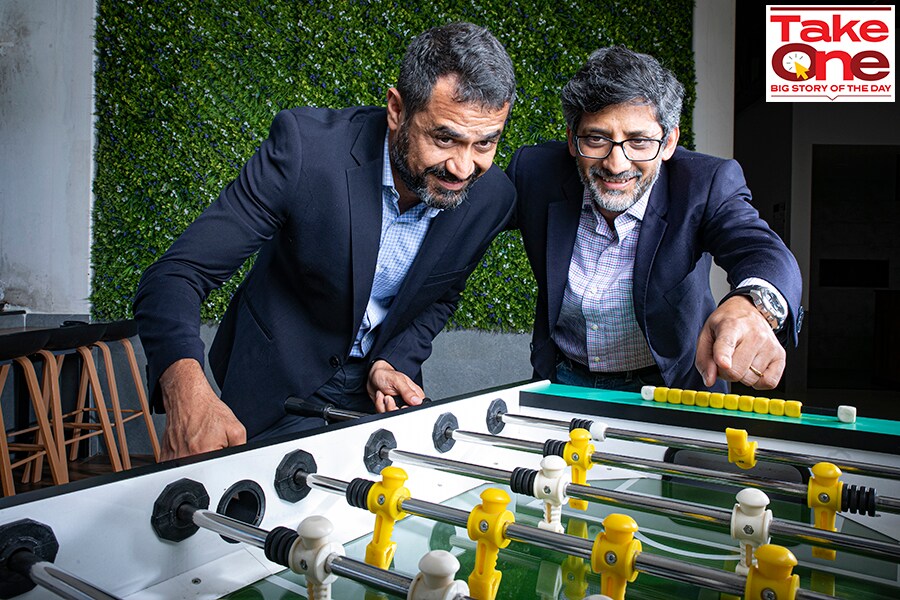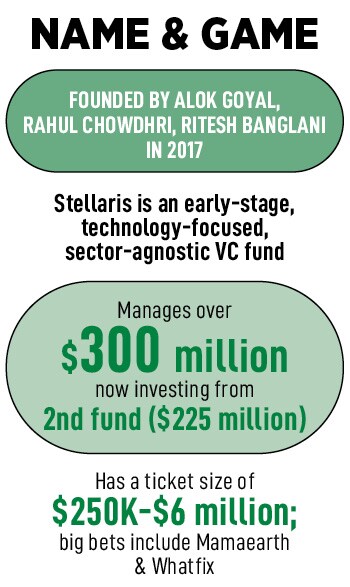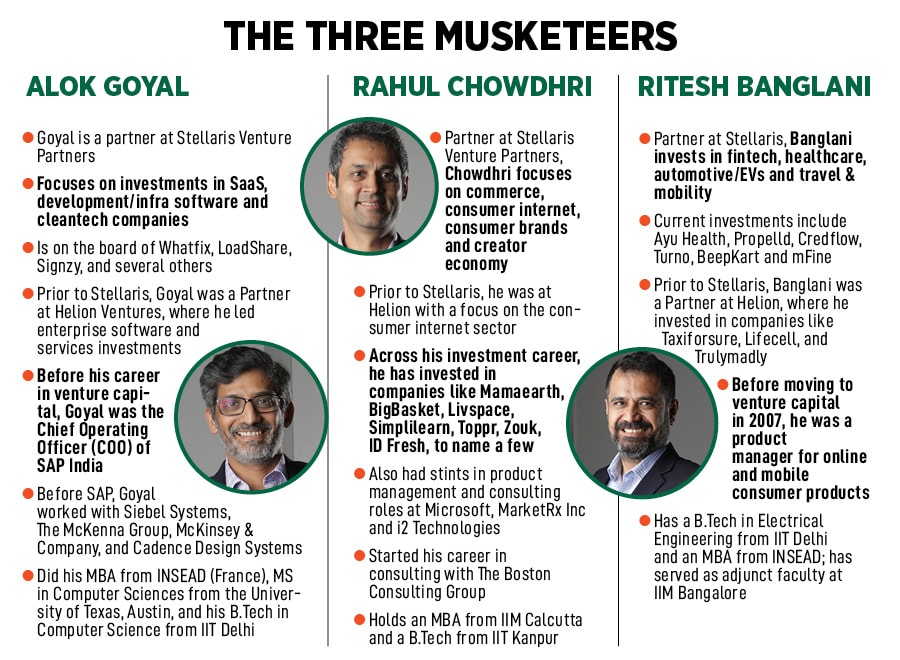
Stellaris Venture Partners' chosen path: Make contrarian bets, but with deep conviction
Stellaris Venture Partners has stayed the path of backing with deep conviction and discipline. But is there a flip side?
 Ritesh Banglani (left) and Alok Goyal Founders of Stellaris Venture Partners
Image: Selvaprakash Lakshmanan for Forbes India
Ritesh Banglani (left) and Alok Goyal Founders of Stellaris Venture Partners
Image: Selvaprakash Lakshmanan for Forbes India
Alok Goyal is enterprising enough to make a candid confession. “This (venture investment) is a business of making mistakes,” reckons the seasoned venture capitalist. Out of every 10 bets that we take, he continues, probably one or two will work. “So there is an 80-90 percent mistake rate in decision making,” says the funder who started his investment journey with Helion Ventures, where he led enterprise software and services investments. In 2017, Goyal teamed up with his former Helion colleagues Ritesh Banglani and Rahul Chowdhri to start Stellaris Venture Partners, an early-stage and sector-agnostic venture capital fund. “We believe that most of the outsized money in venture is made in contrarian bets,” underlines the former chief operating officer of SAP India.
Mamaearth, interestingly, happens to be one such bet. The operating revenue of the D2C skincare beauty unicorn surged 2x to Rs 943 crore in FY22. The profit, though, dropped a tad from Rs 29 crore in FY21 to Rs 14.4 crore. “We believe in investing with conviction, and it can’t be borrowed,” Goyal stresses, adding that Stellaris doesn’t believe in writing a cheque because others are doing so. What differentiates a fund, he underlines, is not its strategy. Reason: Every fund on the ground level is trying to play the same game. Spot the best entrepreneurs, come early in a startup at a low valuation, create big companies and have massive exits. “In a nutshell, that’s everybody’s strategy,” he says. “It is actually the execution that differentiates a fund,” he contends, adding that the DNA of Stellaris is founded on three pillars. First is high-conviction investing. Second is being supportive to entrepreneurs. And the third is being disciplined in investing.

Interestingly, discipline, or the lack of it, is something that the venture world is infamous for. Goyal explains why. The venture industry is prone to cowboys’ behaviour. Most carry a cheque book without admitting that it is not their money. “We are just the guardians of that money. And our LPs (limited partners) expect us to be careful with that capital,” he says. They expect risk-adjusted returns. “Discipline investing is critical to creating a sustained fund,” he adds.
 Goyal’s partner jumps in with his take on investing. “It’s perhaps the best profession in the world because we get paid to be wrong 80 percent of the time,” Ritesh Banglani says in a lighter vein. Stellaris, he contends, doesn’t have a ‘spray and pray’ approach. “We don't write cheques where we say ‘hey, I don’t fully believe in this company but let me write a small cheque and see what happens,” says the investor who invested in companies like Taxiforsure, Lifecell, and Trulymadly at Helion. “We don’t write cheques where we have a small ownership,” he says, adding that the company and the founder have never embraced the cowboy approach of betting on as many companies as possible.
Goyal’s partner jumps in with his take on investing. “It’s perhaps the best profession in the world because we get paid to be wrong 80 percent of the time,” Ritesh Banglani says in a lighter vein. Stellaris, he contends, doesn’t have a ‘spray and pray’ approach. “We don't write cheques where we say ‘hey, I don’t fully believe in this company but let me write a small cheque and see what happens,” says the investor who invested in companies like Taxiforsure, Lifecell, and Trulymadly at Helion. “We don’t write cheques where we have a small ownership,” he says, adding that the company and the founder have never embraced the cowboy approach of betting on as many companies as possible.






 Another contrarian bet happens to be Whatfix. The SaaS-based platform provides in-app guidance and performance support for web applications and software products. When Goyal spotted the startup, he was stumped by the quality of the product they had built. There were two founders, one was coding, the other was selling, and they even had a Fortune 500 customer. From an operating revenue of Rs 27.45 crore in FY19, Whatfix has closed FY22 with Rs 172.42 crore. Though the losses too have jumped—from Rs 13.82 crore to Rs 250 crore—Goyal is not perturbed. In FY22, Whatfix’s entire revenue reportedly came from global markets such as America, Europe, Asia Pacific, and the Middle East region. “They are pretty unique because they’re truly going after enterprise SaaS customers,” he says.
Another contrarian bet happens to be Whatfix. The SaaS-based platform provides in-app guidance and performance support for web applications and software products. When Goyal spotted the startup, he was stumped by the quality of the product they had built. There were two founders, one was coding, the other was selling, and they even had a Fortune 500 customer. From an operating revenue of Rs 27.45 crore in FY19, Whatfix has closed FY22 with Rs 172.42 crore. Though the losses too have jumped—from Rs 13.82 crore to Rs 250 crore—Goyal is not perturbed. In FY22, Whatfix’s entire revenue reportedly came from global markets such as America, Europe, Asia Pacific, and the Middle East region. “They are pretty unique because they’re truly going after enterprise SaaS customers,” he says. 



